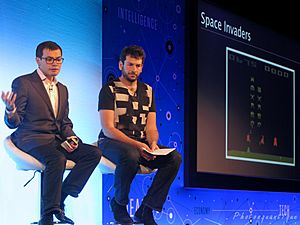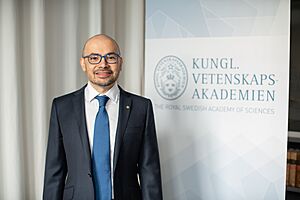Demis Hassabis facts for kids
Sir Demis Hassabis, born on July 27, 1976, is a brilliant British scientist. He is famous for his work in artificial intelligence (AI). He helped start two important companies, Google DeepMind and Isomorphic Labs. He also advises the UK government on AI.
In 2024, Demis Hassabis and John M. Jumper won the Nobel Prize in Chemistry. They received this huge honor for their amazing AI research. Their work helped predict how proteins are shaped. This is a big step in understanding life itself!
Sir Demis is a member of the Royal Society. He has won many other top awards. These include the Breakthrough Prize and the Lasker Award. He was made a Commander of the British Empire (CBE) in 2017. In 2024, he was knighted, becoming "Sir Demis," for his contributions to AI. Time magazine named him one of the 100 most influential people in the world in both 2017 and 2025. He was also chosen as Time's 2025 Time Person of the Year as one of the "Architects of AI."
Quick facts for kids
Sir
Demis Hassabis
|
|
|---|---|

Hassabis in 2025
|
|
| Born | 27 July 1976 |
| Alma mater | |
| Known for | |
| Awards |
|
| Scientific career | |
| Fields | |
| Institutions |
|
| Thesis | Neural Processes Underpinning Episodic Memory (2009) |
| Doctoral advisor | Eleanor Maguire |
| Country | England |
| Title | Candidate Master |
| Years active | 1988–2019 |
| FIDE rating | 2220 (March 2019) |
| Peak rating | 2300 (January 1990) |
Contents
Early Life and Learning
Demis Hassabis grew up in North London. His father was from Cyprus, and his mother was from Singapore. From a very young age, Demis showed incredible talent.
He was a child prodigy at chess, starting at just four years old. By age 13, he was a chess master. He even led many junior chess teams for England. He played chess for the University of Cambridge in important matches.
Demis became interested in computers in 1984. He bought his first computer, a ZX Spectrum, with money he won from chess. He taught himself to program by reading books. Later, he created his first AI program. This program played the board game Reversi.
He attended Queen Elizabeth's School, Barnet. Then he was home-schooled for a year. After that, he studied at Christ's College, Finchley. He finished his high school exams a year early, at age 16.
Starting in Video Games
The University of Cambridge asked Demis to take a year off because he was so young. During this "gap year," he started working at Bullfrog Productions. This was a company that made computer games.
He helped test games like Syndicate. At 17, he co-designed and programmed a game called Theme Park. This game was a huge success, selling millions of copies. It inspired many other simulation games. He earned enough money from this job to pay for his university studies.
Studying at Cambridge
After his time at Bullfrog, Demis went to the University of Cambridge. He studied Computer Science at Queens' College, Cambridge. He graduated in 1997 with top honors.
Career and Discoveries
Making More Games
After university, Demis worked at Lionhead Studios. Here, he was the main AI programmer for the game Black & White. This was a "god game" where players controlled a powerful being.
In 1998, Demis started his own game company called Elixir Studios in London. He helped design games like Republic: The Revolution and Evil Genius. Republic was a very ambitious game. It tried to simulate an entire country using AI. Because it was so big, it faced some challenges. Evil Genius, a fun spy-themed game, was more successful. Elixir Studios closed in 2005.
Studying the Human Brain
After his game company, Demis decided to go back to school. He wanted to study the human brain. He earned his PhD in cognitive neuroscience in 2009. He hoped to find new ideas for AI by understanding how our brains work.
He researched how we imagine things and how our memory works. He found that people with damage to a part of their brain called the hippocampus had trouble imagining new experiences. This showed a link between memory and imagination. His work was even listed as one of the top 10 scientific breakthroughs of the year! He suggested that our minds have a "simulation engine." This engine helps us imagine events to plan better.
Founding DeepMind

In 2010, Demis Hassabis co-founded DeepMind in London. He started it with his friends Shane Legg and Mustafa Suleyman. Their big goal was to "solve intelligence." Then, they wanted to use that intelligence "to solve everything else."
DeepMind wanted to combine ideas from brain science with new computer technology. They aimed to create powerful learning programs. These programs would work towards building artificial general intelligence (AGI). AGI is a type of AI that can learn and understand many different things, like humans can.
Early on, DeepMind focused on teaching AI to master games. In 2013, they made a big breakthrough. They created a program called Deep Q-Network (DQN). This program learned to play Atari games better than humans. It only used the pixels on the screen as information.
In 2014, Google bought DeepMind. Since then, DeepMind has achieved many amazing things.
AlphaGo: Mastering Go
One of DeepMind's most famous achievements is AlphaGo. This program learned to play the ancient game of Go. Go is a very complex game. Experts thought it would be extremely hard for AI to master.
In 2015, AlphaGo beat the European Go champion. Then, in 2016, it famously defeated Lee Sedol, a former world champion. In 2017, it also beat Ke Jie, the world's top-ranked player. These victories showed how powerful DeepMind's AI had become.
Other DeepMind Achievements
DeepMind also created a "neural Turing machine." This is a type of computer that can learn to store and use memories. They also helped Google reduce the energy used by its data centers by 40%. This is a huge saving!
DeepMind has also worked on making AI safe. They partnered with the National Health Service (NHS) in the UK. This partnership aimed to improve medical services. For example, they helped identify early signs of eye diseases.
Demis Hassabis believes AI can be "one of the most beneficial technologies of mankind ever." However, he also warns about potential dangers if AI is misused. He strongly supports more research into AI safety. He signed a statement about the risk of extinction from AI. He thinks this risk should be a global priority. But he also believes the benefits of AI, like helping with health and climate change, are worth pursuing. He stresses the need for tests to measure how capable and controllable new AI models are.
AlphaFold: Understanding Proteins
In 2016, DeepMind used its AI to tackle a major scientific challenge. This challenge was protein structure prediction. For 50 years, scientists wanted to predict the 3D shape of a protein from its basic building blocks.
Proteins are vital for all life. Almost every biological function depends on them. A protein's job is closely linked to its shape. Knowing a protein's structure helps scientists discover new medicines. It also helps them understand diseases better.
DeepMind's tool, AlphaFold, won a major competition in 2018. It accurately predicted the shapes of many proteins. Demis Hassabis called this a "lighthouse project." It was a big step into solving real-world scientific problems.
In 2020, DeepMind announced even better results with AlphaFold 2. This new version was incredibly accurate. It could predict protein shapes almost as well as laboratory experiments. Scientists said the problem was "essentially solved."
Over the next year, DeepMind used AlphaFold 2 to predict the shapes of all 200 million known proteins. They made this system and all the protein structures freely available. Anyone can use them through the AlphaFold Protein Structure Database. This open access helps scientists worldwide.
About Demis Hassabis
Demis Hassabis lives in North London with his family. He is a big fan of the Liverpool FC football team.
He was the main subject of a documentary called The Thinking Game. This film premiered in 2024. It was made by the same person who created the award-winning documentary AlphaGo. That film showed the famous 2016 match between Lee Sedol and AlphaGo.
Awards and Recognitions
Demis Hassabis has received many important awards and honors for his work.
- 2009 – Fellow of the Royal Society of Arts (FRSA)
- 2014 – Mullard Award of the Royal Society
- 2016 – Nature's 10: named one of the 10 most influential scientists of the year
- 2017 – Appointed Commander of the Order of the British Empire (CBE) for "services to Science and Technology"
- 2017 – Time 100: listed as one of the 100 Most Influential People
- 2018 – Elected a Fellow of the Royal Society (FRS)
- 2020 – Dan David Prize – Future Award
- 2022 – Princess of Asturias Award for Technical and Scientific Research
- 2023 – Albert Lasker Award for Basic Medical Research
- 2023 – Canada Gairdner International Award
- 2023 – Breakthrough Prize in Life Sciences for developing AlphaFold
- 2024 – Nobel Prize in Chemistry
- 2024 – Knight Bachelor for "services to artificial intelligence"
- 2025 – Time 100: listed as one of the 100 Most Influential People
- 2025 – Included in Time's Time Person of the Year issue
Research Achievements
His research has been recognized by the journal Science as a Top 10 Scientific Breakthrough of the Year multiple times:
- 2007 – For neuroscience research on imagination
- 2016 – For AlphaGo
- 2020 – For AlphaFold v1
- 2021 – For AlphaFold v2 (Winner)
DeepMind's Awards
DeepMind, under Demis's leadership, has also won many awards:
- Eight Nature front cover articles (2015, 2016, 2019, 2020, two in 2021, 2022, and 2024)
- Honorary 9-dan Go rank for AlphaGo from Go associations in Korea, China, and Japan
- Cannes Lion Grand Prix for the documentary AlphaGo (2016)
- Wired Innovation in AI Award (2016)
- Time 100 most influential companies of 2025
Game Playing Skills
Demis Hassabis is also an expert player of many games. He has won the all-round world board games championship (the Pentamind) five times!
- Chess: Achieved Master standard at age 13.
- Diplomacy: World Team Champion in 2004.
- Poker: Cashed in the World Series of Poker six times.
- Multi-games events: World Pentamind Champion (1998, 1999, 2000, 2001, 2003) and World Decamentathlon Champion (2003, 2004).
See also
 In Spanish: Demis Hassabis para niños
In Spanish: Demis Hassabis para niños


